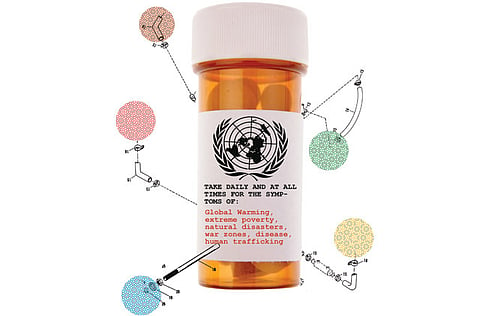United Nations needs a new direction
UN Secretary General Ban Ki-moon on the challenges in front of the global body

The United Nations today leads what seems at times like a double life. On the one hand, pundits criticise it for not solving all the world's ills. On the other hand, UN member states and people around the world are asking it to do more, in more places, than ever before - a trend that will continue in 2011.
It is not hard to see why. We have only to read the newspaper, turn on the television, or go online to appreciate the sheer scale of the need. Conflicts rage in too many places. Natural disasters strike with greater fury, and in greater numbers, than ever before.
On top of all this, we face a new generation of threats, unlike any in history, which spill across borders and have global reach. No single country or group, however powerful, can deal with them alone. All must work together — in common cause for common solutions — to address challenges like climate change, poverty, and nuclear disarmament.
But there is profound scepticism that we can do so. The world looks to the UN as never before, yet the conventional wisdom is that we are not up to the job. The problems are too complicated. Resources are too few. The UN itself appears too divided to make the vital difference.
The conventional wisdom is, however, wrong; worse, it is dangerous, for we have all seen how quickly it can take hold, distort reality, and then harden like cement. For example, four years ago, when I came to office, only a handful of global leaders knew enough even to talk about climate change - the defining challenge of our times, whose effects we see every day, all around us. Today, we have moved climate change to the top of the global agenda.
But make no mistake: it has been a difficult road. In December 2009 in Copenhagen, world leaders talked far into the night, and emerged, according to the conventional wisdom, with virtually nothing. In fact, though we did not get a comprehensive, legally binding treaty that would usher in an era of sustainable, low-carbon prosperity, as we had hoped, there were significant achievements in Copenhagen.
For the first time ever, developed and developing countries acknowledged their responsibility to curb emissions of greenhouse gasses and agreed on the goal of limiting global temperature rise to below two degrees Celsius. And, for the first time ever, countries made large pledges to finance mitigation and adaptation efforts: $30 billion (Dh110.1 billion) over the next three years for fast-start financing, and $100 billion per year by 2020.
The lesson is that we should not dream of overnight breakthroughs, or allow ourselves to fall into despair in the absence of immediate progress. Let us work, instead, to build on many smaller advances, wherever we can make them — by mobilising support, creating broad alliances, building coalitions, and taking into account a web of moving parts and complex issues — because that will set the stage for the eventual breakthroughs of tomorrow.
Collective action has never been easy, but it has never been more necessary than in achieving the UN's Millennium Development Goals (MDGs) — the world's blueprint for ending extreme poverty.
Way forward
The conventional wisdom will tell you that the MDGs targets — reducing poverty and hunger, improving the health of mothers and children, combating HIV/Aids, increasing access to education, protecting the environment, and forging a global partnership for development — are simply unattainable. In fact, we are controlling disease — polio, malaria, and Aids — better than ever before, and making big new investments in women's and children's health — the key to progress in many other areas.
Nevertheless, on climate change, poverty, and other issues, the conventional wisdom is that the UN should cede responsibility to the G20. But the G20, by itself, is not the answer. Despite strenuous debate about currency issues and trade imbalances at its summit in Seoul in November, the sole area of agreement concerned an issue on the G20's agenda for the first time — economic development.
Recognising that global recovery depends on the emerging economies — that is, the developing world — G20 leaders embraced investments aimed at lifting the world's most vulnerable people out of poverty. That is why they accept the need to work closely with the UN — after all, no organisation does development better. The G20 and the UN are finding new ways to work constructively together - not as rivals, but as increasingly close partners. And that is the way it should be.
Forty years ago, a great American statesman, Dean Acheson, looked back at the excitement he felt in helping to build the post-Second World War order. Present at the Creation, he called his memoir.
Today, we find ourselves at an equally exciting moment, no less critical to the future of humankind. We, too, are present at a new creation. And the UN must constantly re-create itself as well. We must evolve and keep pace with a rapidly changing world.
We must be faster and more flexible, efficient, transparent, and accountable. In an age of austerity, resources are precious; we must make every dollar count. These are testing times for everyone. People everywhere live in growing anxiety and fear. There is near-universal loss of trust in institutions and leaders.
Amid such uncertainty, our future depends on a UN that brings together the countries of the world not only to talk and debate, but also to agree and to act; that mobilises civil society, business, philanthropists, and ordinary citizens to help the world's governments solve current problems; and that delivers peace, development, human rights, and global public goods — in a word, hope — to people around the world every day.
— Project Syndicate, 2010



